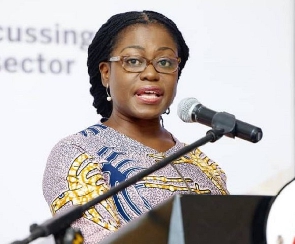The Second Deputy Governor of Bank of Ghana (BoG), Mrs Elsie Addo Awadzi, has called for a unified data architecture to help connect existing databases for effective policy formulation and regulation of the financial sector.
According to her, a unified data architecture would help for the design of appropriate financial products and services to meet the needs of all economic actors in Ghana.
Mrs Awadzi made the call at the maiden Institute of Statistical, Social and Economic Research (ISSER) and World Bank Inclusive Finance Development Series on the theme “Financial Inclusion for All: An Analysis of Ghana’s Findex Data”.
Speaking on the topic “Monitoring for Inclusion; The role of an inclusive Financial Sector Data Architecture”, the Second Deputy Governor said a unified data architecture had become necessary in view of the financial inclusion efforts of the government to help all economic actors to have access to financial services.
“As we work towards a unified data architecture, efforts must be put in place to promote data integrity, data privacy, systems robustness, and effective data governance,” she stated.
The Second Deputy Governor said the roll-out of the biometric Ghana Card, which was now designated as the single identity card for purposes of financial transactions, held promise for promoting unified data architecture for monitoring financial inclusion.
She said the exclusive use of the Ghana card for financial transactions would help track users across the whole spectrum of financial services, and will facilitate both demand and supply-side data collection and analysis to measure progress in access to finance.
Mrs Awadzi said the forum provided a unique platform to deliberate on the role of data in promoting financial inclusion to advance our socio-economic objectives as a nation.
She said data was essential to help measure gaps in financial inclusion, design appropriate evidence-based interventions, and monitor their implementation and effectiveness.
She said since 2011, the World Bank Global Findex Database had been one of the most comprehensive and authoritative comparative data sources on access to financial services in the developing world.
Mrs Awadzi explained that the Global Findex Database provided almost 300 indicators on topics such as account ownership, payments, savings, credit, and financial resilience, disaggregated on the basis of gender, age, and other demographics.
“As we deliberate on the 2021 Ghana Findex Data today, we need to brainstorm on ways in which we can pull together various data sources, avoid duplication of efforts, and improve on data quality, accessibility, and governance to support an inclusive, sustainable, and resilient financial sector,” Mrs Awadzi stated.
Business News of Saturday, 13 May 2023
Source: ghanaiantimes.com.gh

















